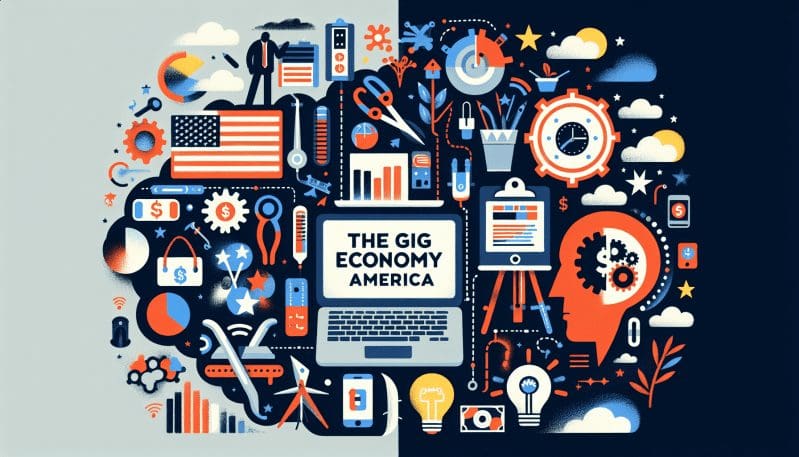In the bustling streets of America’s cities and the scrolling feeds of its digital landscapes, the gig economy has bloomed as a modern embodiment of work. Platforms like Uber, Lyft, and Upwork have ripped up the playbook of traditional employment, offering a promise of flexibility and entrepreneurial freedom that resonates with the spirit of the American Dream. Yet, beneath the sleek apps and the allure of ‘being your own boss,’ there lies a complex web of challenges that cast a shadow over this model’s sustainability for the workforce.
**The Promises vs. the Reality**: Gig work is seductive, trumpeting the virtues of flexibility and autonomy. But do these benefits truly pan out for the average American worker? It’s a siren song with variable effects, where some find harmony in setting their own schedules, and others struggle against the tide of uncertainty and irregular income. The reality of gig work often rings differently depending on one’s socio-economic bracket, educational attainments, and even the zip code they call home. This dichotomy casts a profound question on the true accessibility of the ‘freedom’ gig work is supposed to offer.
**Worker Classification and Rights**: At the crux of the gig economy lies a contentious debate: are gig workers independent contractors or employees? This distinction is far from academic—it’s a line that separates workers from fundamental labor rights like healthcare, job security, and the power of collective voice through unions. The trend towards independent contracting is eroding these traditional bulwarks of worker protection, leaving many to wonder if they’re witnessing the unravelling of decades worth of labor progress.
**Economic Impact and Job Market Shifts**: The gig economy is shaking the foundations of the traditional job market. Wages are often inconsistent, and the pathway to career progression can seem like a mirage in the desert of short-term contracts. For some, the gig economy has fractured the American dream into a thousand contingent gigs, undermining the aspiration for long-term, stable employment. As the job market contorts to accommodate this new reality, we must consider the broader implications for the economic future.
**Social Safety Nets and Policy Responses**: The current social safety nets woven by decades of policy and practice appear ill-equipped to catch those falling through the expanding gaps in the gig economy. Health insurance, retirement savings, and unemployment benefits—cornerstones of the American worker’s security—are often inaccessible to those outside traditional employment. Are our policies lagging behind our work realities, and what reforms could be penned to protect the burgeoning gig workforce?
**The Role of Big Tech and Corporate Responsibility**: Big Tech companies are the architects and profiteers of the gig economy. Their algorithms decide who works and who doesn’t, their platforms are the marketplaces of modern labor, and their business models are predicated on the independent contractor paradigm. We must scrutinize their place in the gig ecosystem and assess how they can better shoulder the responsibility towards those who power their services, beyond the confines of profit and innovation.
**Personal Stories and Diversity of Experiences**: The gig economy does not wear a single face; it’s a mosaic of experiences shaped by race, gender, age and more. Personal stories from within the gig workforce illuminate the triumphs and tribulations of gig work, offering a kaleidoscope view of its impact. From the retiree driving to supplement their pension to the immigrant leveraging rideshare apps to carve out a living, these narratives are the heartbeat of the gig economy’s reality.
**Looking Ahead**: What does the future hold for the gig economy? With AI and automation poised to play larger roles in our working lives, we stand at the threshold of a new horizon. How will technology redefine work, and can the gig economy evolve to offer both innovation and equitable labor standards? These are the questions that will shape the workplaces of tomorrow.
**Call to Action**: Our examination ends, but the conversation must continue. We call upon our readers, policymakers, and industry leaders to lean into the discourse, to craft and enact solutions that recalibrate the gig economy. It is incumbent upon all of us to work towards a future where gig work is not a byword for vulnerability, but a genuine choice for empowerment and prosperity within the American workforce.
The Work Times invites you to delve into these issues, to question, to discuss, and to envision the future of work. Together, let’s shape a narrative where the gig economy is a force for good, a chapter in the American story where flexibility pairs with security, and innovation walks hand in hand with responsibility.




























